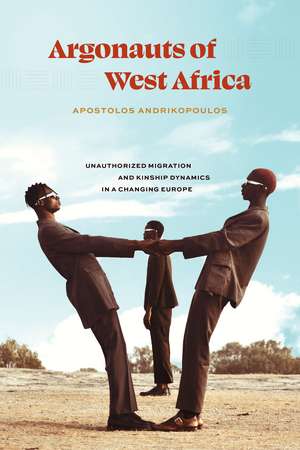Argonauts of West Africa: Unauthorized Migration and Kinship Dynamics in a Changing Europe
Autor Apostolos Andrikopoulosen Limba Engleză Paperback – 10 mai 2023
In rapidly changing and highly precarious contexts, unauthorized African migrants turn to kinship in search of security, stability, and predictability. Through the exchange of identity documents between “siblings,” assistance in obtaining such documentation through kinship networks, and marriages that provide access to citizenship, new assemblages of kinship are continually made and remade to navigate the shifting demands of European states. These new kinship relations, however, often prove unreliable, taking on new, unexpected dynamics in the face of codependency; they become more difficult to control than those who enter into such relations can imagine. Through unusually close ethnographic work in West African migrant communities in Amsterdam, Apostolos Andrikopoulos reveals the unseen dynamics of kinship through shared papers, the tensions of race and gender that develop in mutually beneficial marriages, and the vast, informal networks of people, information, and documentation on which migrants rely. Throughout Argonauts of West Africa, Andrikopoulos demonstrates how inequality, exclusionary practices, and the changing policies of an often-violent state demand innovative ways of doing kinship to successfully navigate complex migration routes.
| Toate formatele și edițiile | Preț | Express |
|---|---|---|
| Paperback (1) | 183.89 lei 3-5 săpt. | +10.99 lei 6-12 zile |
| University of Chicago Press – 10 mai 2023 | 183.89 lei 3-5 săpt. | +10.99 lei 6-12 zile |
| Hardback (1) | 564.15 lei 3-5 săpt. | +21.84 lei 6-12 zile |
| University of Chicago Press – 10 mai 2023 | 564.15 lei 3-5 săpt. | +21.84 lei 6-12 zile |
Preț: 183.89 lei
Nou
Puncte Express: 276
Preț estimativ în valută:
35.19€ • 36.69$ • 29.25£
35.19€ • 36.69$ • 29.25£
Carte disponibilă
Livrare economică 28 februarie-14 martie
Livrare express 13-19 februarie pentru 20.98 lei
Preluare comenzi: 021 569.72.76
Specificații
ISBN-13: 9780226822624
ISBN-10: 0226822621
Pagini: 224
Ilustrații: 9 halftones, 4 tables
Dimensiuni: 152 x 229 x 15 mm
Greutate: 0.29 kg
Ediția:First Edition
Editura: University of Chicago Press
Colecția University of Chicago Press
ISBN-10: 0226822621
Pagini: 224
Ilustrații: 9 halftones, 4 tables
Dimensiuni: 152 x 229 x 15 mm
Greutate: 0.29 kg
Ediția:First Edition
Editura: University of Chicago Press
Colecția University of Chicago Press
Notă biografică
Apostolos Andrikopoulos is a Marie Skłodowska-Curie Global Fellow at Harvard University and at the University of Amsterdam.
Cuprins
1 Navigating Kinship
2 Unauthorized Identity Craft
3 “Working with My Sister’s Papers”
4 Dying Relations?
5 Marriage, Love, and Inequality
Conclusion Unpredictable Dynamics of Kinship
Acknowledgments
Appendix: Trust and Ethics
Notes
Bibliography
Index
2 Unauthorized Identity Craft
3 “Working with My Sister’s Papers”
4 Dying Relations?
5 Marriage, Love, and Inequality
Conclusion Unpredictable Dynamics of Kinship
Acknowledgments
Appendix: Trust and Ethics
Notes
Bibliography
Index
Recenzii
"The book is a sophisticated and detailed account of the social aspects of African migrants’ lives in precarious contexts. The stories of the different protagonists enable us to look anew at the meaning of kinship and its importance for personhood and social identity formation in contemporary Europe. They advance our understanding of the usefulness of theories on kinship, the family and friendship in the context of migration. As such, the book is a very valuable resource for students, researchers, and policymakers who are interested to learn about migration, kinship and social inequality."
"The author provides a careful description of the dizzying complexity of migratory processes […] as well as the risks and confusion that characterize the trajectories of precarious migrants."
“In this sophisticated, original, and wonderfully detailed ethnography of migrants’ lives, Andrikopoulos shows how the creative possibilities of kinship provide a highly flexible resource for migrants to ‘craft’ documented selves and settle in Europe. In so doing, he illuminates both the expansive and generative possibilities of kinship and its continued pertinence as a means of resisting state efforts to control migration and citizenship.”
“A lively account of how undocumented migrants in Amsterdam use kinship as they seek to establish themselves in the context of the Dutch state’s efforts to control immigration and increasing migrant precarity. With its detailed narratives, fresh perspectives, and important research, Argonauts of West Africa will be of interest to scholars of Africa, Europe, and migration—and, of course, kinship.”
“This is a fascinating ethnography of West African nimble-footedness. It explores and explains ties and thirsts that defy the European logic and practice of containment of mobility and the incompleteness that fuels it.”
"Andrikopoulos provides detailed insight in the everyday lives of West African migrants and their intimate others, both in their lives in Amsterdam, as well as across multiple borders. . . . the reader is swiftly invited to a glimpse of the positionality of the ethnographer and the complex webs of relations and reciprocities surrounding him."
"Throughout his dynamic and gripping ethnography, Andrikopoulos presents a vivid portrayal of the regime of restrictive and increasingly stringent immigration policies aimed at deterring immigrants and forcing them to stay put. . . . Importantly, the monograph challenges the binary way of seeing migrants as either victims of structural inequalities or as active agents. In addition to reintroducing how civic inequality affects population mobility, Andrikopoulos’ findings call attention to the importance of creating humane policies and practices rather than seeking to stem migration."
"Andrikopoulos shows how kinship, usually studied as something pertaining to ‘traditional’ societies, is part and parcel of the modern state. Kinship for the participants in this study is a way to deal with and at the same time circumvent a restrictive state. Argonauts of West Africa provides a detailed description of these kinship practices showing not only the possibilities they enable and how they can be beneficial, but also the tensions and inequalities that such kinship relationships entail.”
